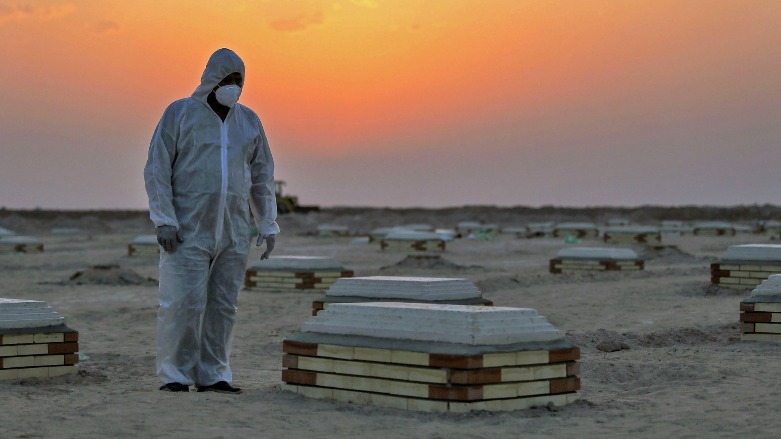COVID-19: Iraq hits single-day record of 1,635 cases, 69 deaths

ERBIL (Kurdistan 24) – On Friday, the Iraqi Ministry of Health and Environment announced 69 new coronavirus fatalities over the previous 24 hours, after the country recorded its highest daily death toll of 83 the day before.
Read More: COVID-19: Iraq announces 1,463 new cases, record of 83 deaths in single day
Iraqi health officials on Friday also confirmed a record spike of 1,635 new cases in the country. "The total number of infections rose to 27,352, the total number of recovered cases to 12,205, total active cases to 14,122, those in intensive care to 200, and the total deaths to 925," read a ministry statement released to the press.
The ministry also reported that 11,227 laboratory tests had been completed over the past 24 hours, bringing the total conducted to date in Iraq to 425,192.
The figures do not include today's developments in the autonomous Kurdistan Region, which has its own health ministry and typically announces results later in the day. As such, Kurdistan's figures are usually added to the following day's national tally.
On Thursday, the Kurdistan Regional Government (KRG) confirmed that it had announced the highest number of daily infections, since the beginning of the outbreak—266 new coronavirus cases—during the preceding 24 hours.
WHO: Lax Practices of Iraqi Citizens Contributing to Spread of the Disease
The day before, on Wednesday, the representative of the World Health Organization (WHO) in Baghdad strongly criticized those Iraqis who have been spreading rumors that the coronavirus is not real, and it is, instead, part of a large, global conspiracy.
"Unfortunately, some Iraqi citizens are lying, about the fact that the coronavirus actually exists, and this is not true,” Adham Ismael said in a statement to local media.
“The virus is real, not a lie, and everyone should believe it," he emphasized.
Ismael also pointed out the multiple ways that ordinary Iraqis are contributing to the high rate of infections in the country, often exceeding one thousand per day.
It is due to “social gatherings, sports tournaments in the month of Ramadan and during Eid; the continuation of concerts and consolation gatherings; lack of interest in preventive measures; and citizens' underestimating the coronavirus."
"The Iraqi government has done all that is possible and cannot allocate a policeman to every citizen to prevent him from roaming," Ismael added, noting "the citizen is the one who can protect himself and his family from the virus by adhering to the preventive measures and instructions issued by the government and the Ministry of Health.
Senior Iraqi religious authorities, including Iraq’s top cleric, Grand Ayatollah Ali Sistani, have repeatedly issued religious decrees calling on the people to follow the instructions of the Iraqi Ministry of Health.
However, populist clerics, like Muqtada al-Sadr, say the opposite and tell people what they would like to believe: the virus is no danger.
Such statements from Sadr even prompted the Health Ministry to send him an official letter, asking him to take the government’s measures seriously and advise his followers accordingly, as Al-Monitor earlier reported.
In that respect, figures like Sadr resemble populist leaders elsewhere, like Brazil’s president, Jair Bolsonaro, who, from the beginning of the coronavirus pandemic, has dismissed it “as a little flu.”
The result has been that Brazil now has the highest fatality rate per capita from the coronavirus of any country in the world, and the highest per capita rate of infections.
Editing by Laurie Mylroie
